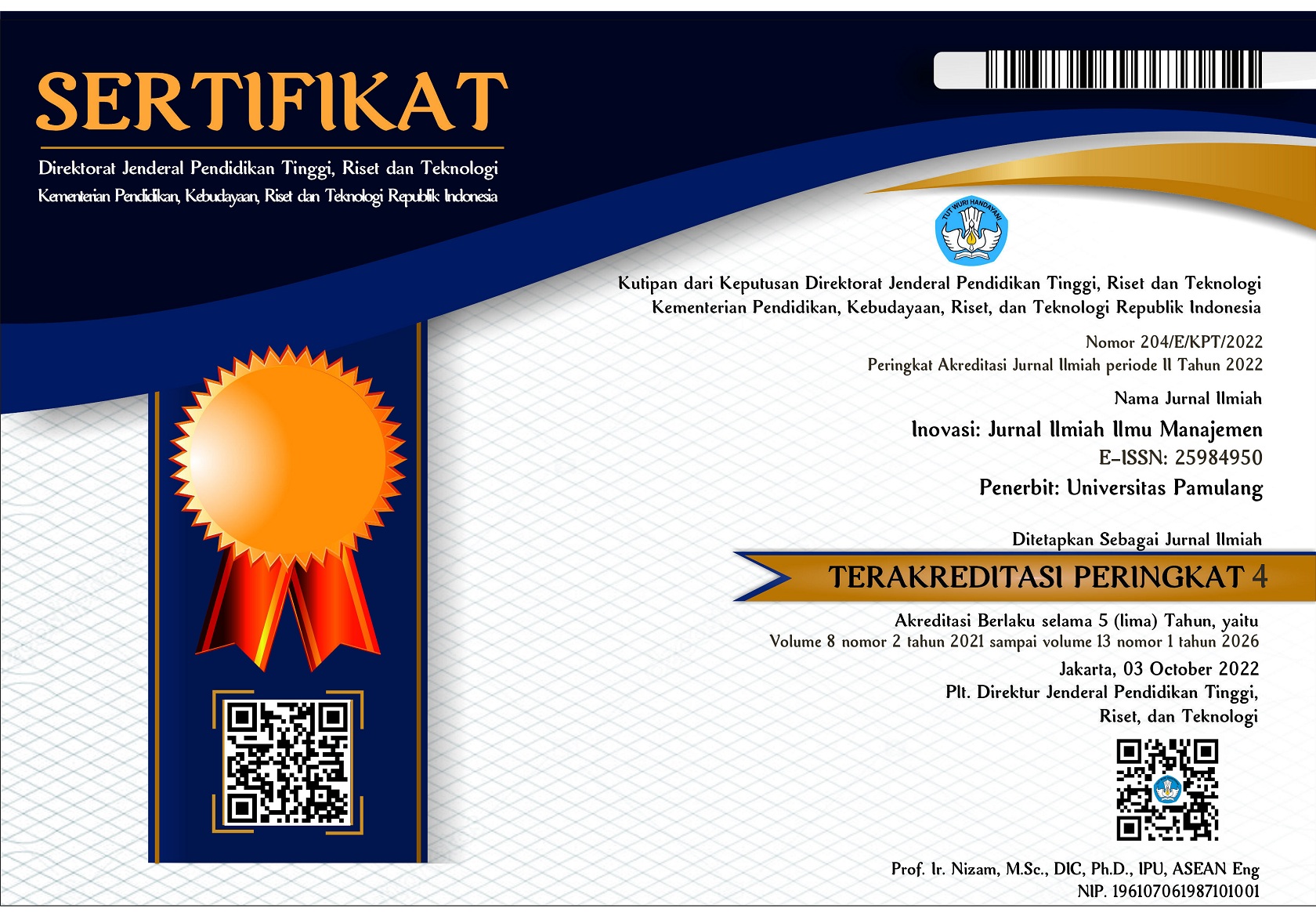Pengaruh E - Service Quality terhadap E-Loyalty Tiket di Aplikasi Access by KAI Dengan E-Satisfaction Sebagai Variabel Intervening
DOI:
https://doi.org/10.32493/Inovasi.v11i1.p215-224.40443Keywords:
E-Loyalty; E-Satisfaction; E-Service QualityAbstract
Penelitian ini bertujuan untuk mengetahui pengaruh E-Service Quality terhadap E-Loyalty melalui E-Satisfaction sebagai variabel intervening pada pengguna aplikasi Access by KAI. Penelitian ini berfokus pasa aplikasi transaportasi umum berupa kereta api yang paling banyak digunakan oleh masyarakat. Populasi pada penelitian ini yaitu Mahasiswa Ekonomi dan Bisnis, Universitas Pembangunan Nasional “Veteran” Jawa Timur. Sampel dipilih menggunakan teknik purposive sampling dengan memperoleh 98 responden. Penelitian ini menggunakan Partial Least Square (PLS) sebagai teknik analisis data. Hasil penelitian ini menunjukkan bahwa E-Service Quality memiliki kontribusi terhadap E-Satisfaction, E-Service Quality memiliki kontribusi terhadap E-Loyalty, E-Satisfaction memiliki kontribusi terhadap E-Loyalty, dan E-Service Quality memiliki kontribusi terhadap E-Loyalty melalui E-Satisfaction.
References
Ashghar, S. A., & Nurlatifah, H. (2020). Analisis pengaruh perceived ease of use, perceived usefulness, dan perceived risk terhadap keinginan membeli kembali melalui e-trust dan s-satisfaction (Studi kasus pengguna Gopay pada transaksi UMKM). Jurnal Al Azhar Indonesia Seri Ilmu Sosial, 1(1), 40-52.
Atmojo, J. J. T., & Widodo, T. (2022). Pengaruh E-Service Quality terhadap E-Customer Loyalty melalui E-Customer Satisfaction sebagai Variabel Intervening Pada Aplikasi Tiket.com. Jurnal Manajemen (Edisi Elektronik), 13(1), 133-149.
Budiman, A., Yulianto, E., & Saifi, M. (2020). Pengaruh e-service quality terhadap e-satisfaction dan e-loyalty nasabah pengguna mandiri online. Profit: Jurnal Administrasi Bisnis, 14(1), 1-11.
Fazria, M. A. S. Y., & Rubiyanti, R. N. (2019). Pengaruh e-service quality terhadap e-customer loyalty dengan e-customer satisfaction sebagai variabel intervening (studi kasus pada pelanggan Traveloka di Bandung). eProceedings of Management, 6(2).
Ghozali, I., & Latan, H. (2020). Partial Least Squares: Konsep, Teknik dan Aplikasi Menggunakan SmartPLS 3.0 Untuk Penelitian Empiris (Vol. 2). Universitas Diponegoro.
Ha, M. T. (2021). The Impact of Customer Value on Customer Satisfaction and Customer Loyalty in Hotel Firms. Tourism Research, 42(3), 141–158.
Irhamna, C. A., & Dermawan, R. (2023). The Effect of E-Service Quality and E-Wom on Purchase Decisions Through the Tiktok Shop Application among Collage Students in Surabaya. Jurnal Ekonomi dan Bisnis Digital, 2(3), 667-686.
Istighfarnissa, N., Pradhanawati, A., & Prabawani, B. (2022). Pengaruh e-service quality dan e-trust terhadap e-loyality dengan e-satisfaction sebagai variabel intervening (Studi pada pembelian tiket di situs Traveloka). Jurnal Ilmu Administrasi Bisnis, 11(3), 399-410.
Kotler, P., Keller, K. L., & Chernev, A. (2022). Marketing Management. Pearson.
Mulia, I. O., & Fitriyah, Z. (2023). The Impact of E-Service Quality and Sales Promotion on Purchase Decisions in the Zalora Online Shopping Application (Case Stdy on Zalora Consmers in Surabaya). Jurnal Ekonomi dan Bisnis Digital, 2 (3), 997-1006.
Nugroho, R.H. (2024). Pengaruh Brand Image, Brand Trust, Brand Satisfaction terhadap Brand Loyalty pada E-Wallet Gopay. Reslaj: Religion Edcation Social Laa Roiba Journal, 6 (5), 2640-2652.
Putra, M. F. H., & Kusuma, Y. B. (2023). Promosi Online dan E-Service Quality terhadap Loyalitas Konsumen Aplikasi Grab (Studi Kasus pada Mahasiswa UPN “Veteran” Jawa Timur). Management Studies and Entrepreneurship Journal (MSEJ), 4 (4), 4350-4357.
Rachman, A. A. (2021). Pengaruh E-Service Quality dan E-Trust terhadap E-Loyalty melalui E-Satisfaction (Studi Kasus: Pelanggan Traveloka di Surabaya) (Doctoral dissertation, Upn “Veteran” Jawa Timur).
Susilo, D. (2020). Unlocking The Secret of E-Loyalty: A Study from Tiktok Users in China. International Journal of Economics, Business, and Entrepreneurship, 3(1), 37–49.
Sugiyono. (2019). Metode Penelitian Kuantitatif, Kualitatif dan R&D. Alfabeta.
Syahidah, A. A., & Aransyah, M. F. (2023). Pengaruh E-Service Quality dan E-Trist Terhadap E-Customer Loyalty Pada Pengguna Dompet Digital DANA melalui E-Satisfaction Sebagai Variabel Intervening. Jurnal Sisfokom (Sistem Informasi dan Komputer), 12(1), 36-44.
Tjiptono, F., & Chandra, G. (2019). Service Quality & Customer Satisfaction (5th ed.). Andi.
Wilis, R. A., & Nurwulandari, A. (2020). The effect of E-service quality, E-Trust, Price and Brand Image Towards E-Satisfaction and Its Impact on E-loyalty of Traveloka’s Customer. Jurnal Ilmiah MEA (Manajemen, Ekonomi, & Akuntansi),4(3),1061–1099.
Downloads
Published
How to Cite
Issue
Section
License
Authors who publish with this journal agree to the following terms:
- Authors retain copyright and grant the journal right of first publication with the work simultaneously licensed under a Creative Commons Attribution License that allows others to share the work with an acknowledgement of the work's authorship and initial publication in this journal.
- Authors are able to enter into separate, additional contractual arrangements for the non-exclusive distribution of the journal's published version of the work (e.g., post it to an institutional repository or publish it in a book), with an acknowledgement of its initial publication in this journal.
- Authors are permitted and encouraged to post their work online (e.g., in institutional repositories or on their website) prior to and during the submission process, as it can lead to productive exchanges, as well as earlier and greater citation of published work (See The Effect of Open Access).
INOVASI: journal of managenet have CC-BY-SA or an equivalent license as the optimal license for the publication, distribution, use, and reuse of scholarly work.
In developing strategy and setting priorities, INOVASI: JOURNAL OF MANAGEMENT recognize that free access is better than priced access, libre access is better than free access, and libre under CC-BY-SA or the equivalent is better than libre under more restrictive open licenses. We should achieve what we can when we can. We should not delay achieving free in order to achieve libre, and we should not stop with free when we can achieve libre.









